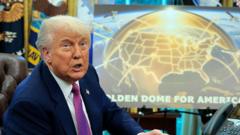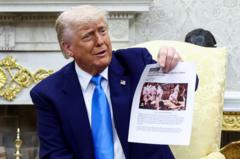As Donald Trump prepares for a second term, both domestic and global implications raise concerns and curiosity.
**Trump's Historic Comeback: What It Means for America and Beyond**

**Trump's Historic Comeback: What It Means for America and Beyond**
After four years away, Trump triumphs in a dramatic election, despite ongoing controversies.
In what many are calling one of the most dramatic political comebacks in American history, Donald Trump is poised to reclaim the White House. Millions of voters turned out to give him another chance, despite the controversies surrounding his prior administration and ongoing legal challenges. This election was marked by unexpected twists; notably, President Joe Biden's premature withdrawal from the race has led to intense debates on what has shaped voter sentiment.
While counting continues, initial reports from key battleground states indicate a clear preference for Trump, fueled largely by economic concerns and matters of immigration. This vote comes four years after he lost to Biden, a defeat he has been reluctant to accept. Trump's contentious relationship with the electoral outcomes had sparked ongoing inquiries about his attempts to reverse the election result, notably the violence that erupted during the Capitol riots on January 6, 2021.
His divisive presence in the political sphere is underscored by his recent felony conviction for falsifying business records and accusations linked to the Capitol insurrection. The electorate's response has been starkly polarized; voters express frustration with Trump's rhetoric but rally behind his economic messaging. Many cite a longing for the economic stability they associated with Trump's first term, despite acknowledging the external factors contributing to inflation during the Biden administration.
Concerns surrounding immigration policy and border enforcement have also influenced voter preferences, as many disapprove of the newly elevated immigration figures during Biden's term. The passionate “America first” slogan remains a powerful draw, resonating with those who question foreign expenditures in favor of national revitalization.
Yet, a curious irony lies in Trump's candidacy: he now represents change despite previously being in power. Supporters see him as free from the constraints of traditional politics, but there is significant concern about how unrestrained this could make him, especially given the various former aides who have publicly criticized his behavior.
Despite these apprehensions, Trump's narrative remains influential. He positions America as a nation in decline, relying on his assurances to "Make America Great Again." In stark contrast, Harris cautioned about threats to democracy posed by another Trump administration, but voters have shown a reluctance to support continuity over perceived rejuvenation—even if it comes from a former president.
As Trump embarks on this new term, the global audience is poised to witness the ramifications of his potential policies, especially regarding international trade and military engagements. The questions of whether Trump's ambitions will align with the desires of both Americans and the international community linger heavily.
Ultimately, this election has revealed divergent visions for America—one veering towards a new recognition of Trump's approach, and the other urging a return to conventional governance. The unfolding of Trump's second term will undoubtedly shape both national policies and international relations, leaving history to assess the true impact of this extraordinary comeback.
While counting continues, initial reports from key battleground states indicate a clear preference for Trump, fueled largely by economic concerns and matters of immigration. This vote comes four years after he lost to Biden, a defeat he has been reluctant to accept. Trump's contentious relationship with the electoral outcomes had sparked ongoing inquiries about his attempts to reverse the election result, notably the violence that erupted during the Capitol riots on January 6, 2021.
His divisive presence in the political sphere is underscored by his recent felony conviction for falsifying business records and accusations linked to the Capitol insurrection. The electorate's response has been starkly polarized; voters express frustration with Trump's rhetoric but rally behind his economic messaging. Many cite a longing for the economic stability they associated with Trump's first term, despite acknowledging the external factors contributing to inflation during the Biden administration.
Concerns surrounding immigration policy and border enforcement have also influenced voter preferences, as many disapprove of the newly elevated immigration figures during Biden's term. The passionate “America first” slogan remains a powerful draw, resonating with those who question foreign expenditures in favor of national revitalization.
Yet, a curious irony lies in Trump's candidacy: he now represents change despite previously being in power. Supporters see him as free from the constraints of traditional politics, but there is significant concern about how unrestrained this could make him, especially given the various former aides who have publicly criticized his behavior.
Despite these apprehensions, Trump's narrative remains influential. He positions America as a nation in decline, relying on his assurances to "Make America Great Again." In stark contrast, Harris cautioned about threats to democracy posed by another Trump administration, but voters have shown a reluctance to support continuity over perceived rejuvenation—even if it comes from a former president.
As Trump embarks on this new term, the global audience is poised to witness the ramifications of his potential policies, especially regarding international trade and military engagements. The questions of whether Trump's ambitions will align with the desires of both Americans and the international community linger heavily.
Ultimately, this election has revealed divergent visions for America—one veering towards a new recognition of Trump's approach, and the other urging a return to conventional governance. The unfolding of Trump's second term will undoubtedly shape both national policies and international relations, leaving history to assess the true impact of this extraordinary comeback.




















